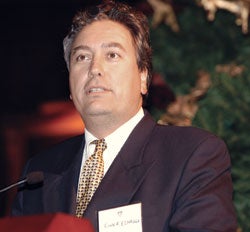Headlines on any given day underscore the increasing globalization of antitrust law and economics—for example, “Apple iTunes charged by EC with restrictive pricing practices.”
“Modern antitrust law is global antitrust law,” says HLS Professor Einer Elhauge ’86, co-author of the newly published book, “Global Antitrust Law and Economics” (Foundation Press, 2007), written with Damien Geradin, a professor at Tilburg University in the Netherlands. In the iTunes case, Apple’s lawyers will encounter a complicated web of rules and regulations that didn’t exist prior to the EC’s formation, and they will be required to consult with experts and lawyers in a number of countries, Elhauge notes.
Elhauge has been teaching students about the increasing cross-border aspects of competition law for some time, but says that when he looked for a textbook on global antitrust that matched Harvard’s leading-edge teaching on the subject, he found that traditional antitrust casebooks were “rapidly becoming outmoded,” with their typical focus on the law of only one nation.
Moreover, he notes, when he was in practice before joining the HLS faculty, he was surprised to learn that decision-making wasn’t always based on the antitrust doctrines he had studied in law school. “Agencies have a ‘secret body of law’, and only insiders know what’s really going on,” he says. Real-world antitrust economic dynamics, he explains, are very different from pure economics—what makes rational sense in a perfect world—and are instead concerned with “administrability and the implementation of economic concepts in a world where information is limited, decision-makers are imperfect, adjudication is lengthy and costly, and parties are strategic both in litigation and in responding to different substantive rules.”
Thus, he decided to produce what he calls “the first law book … to cover these issues in a global way,” and in real-world terms.
One focus that distinguishes modern global antitrust law and practice from the past, he says, is “the dominance of the economic model of analyzing antitrust and competition policy.” The way in which Elhauge and Geradin convey the increasing use of economics as a common language across various regimes makes the book “enormously teachable,” says Robert H. Lande ’78, a leading antitrust expert and a professor at the University of Baltimore School of Law.
The book will be valuable for interested students and practitioners at every level, from beginners to “upper level students… and antitrust lawyers with an international practice,” Lande says. Discussion of recent advances in economic theory—and how they impact antitrust law—is accompanied by detailed mathematical formulae in extensive footnotes for those interested in a deeper level of analysis.
For each of the various areas of antitrust law covered in the book, the authors provide background history and context, and then analysis of the laws and general legal standards of the U.S., the EC and other countries—the latter treated in more depth when they present a “third way” of addressing an issue.
They also pose intriguing questions designed to encourage students to think globally. Why, for example, did the Doha negotiations fail to achieve agreement on antitrust law and policy, when—as demonstrated in the text—agreement would have been in the rational economic interests of the very group of developing nations who prevented it? Readers are asked what policy choices they would have advised, and whether there should be an international antitrust regime or, instead, different regimes for differing political economies.
If there is a simple snapshot that can be offered to show the book’s usefulness on a global scale, it is that one of Elhauge’s S.J.D. students, Dina Waked LL.M. ’06, recently used an advance copy to teach an antitrust class of her own—in Cairo. And Prof. Lande used it, too—in a class he taught in Haifa.
— Margaret A. Salinger
